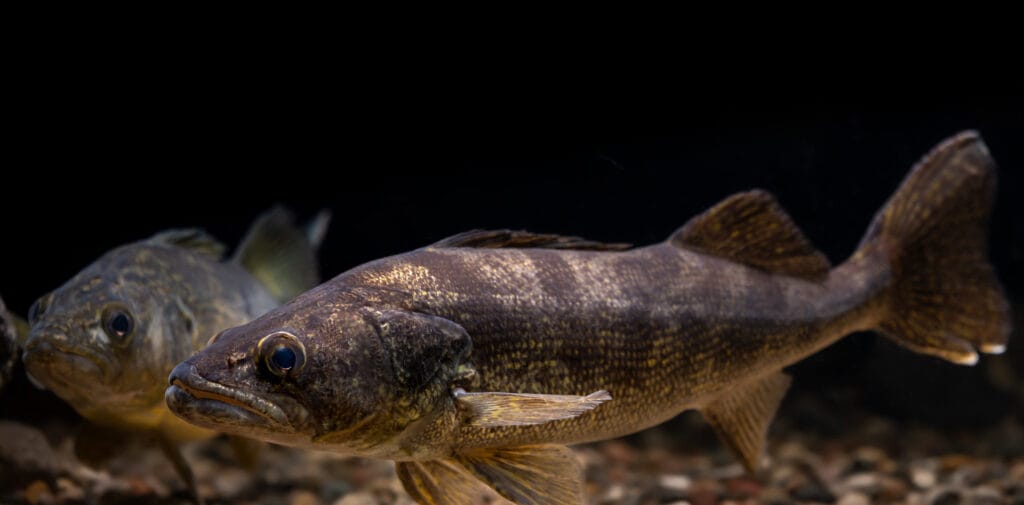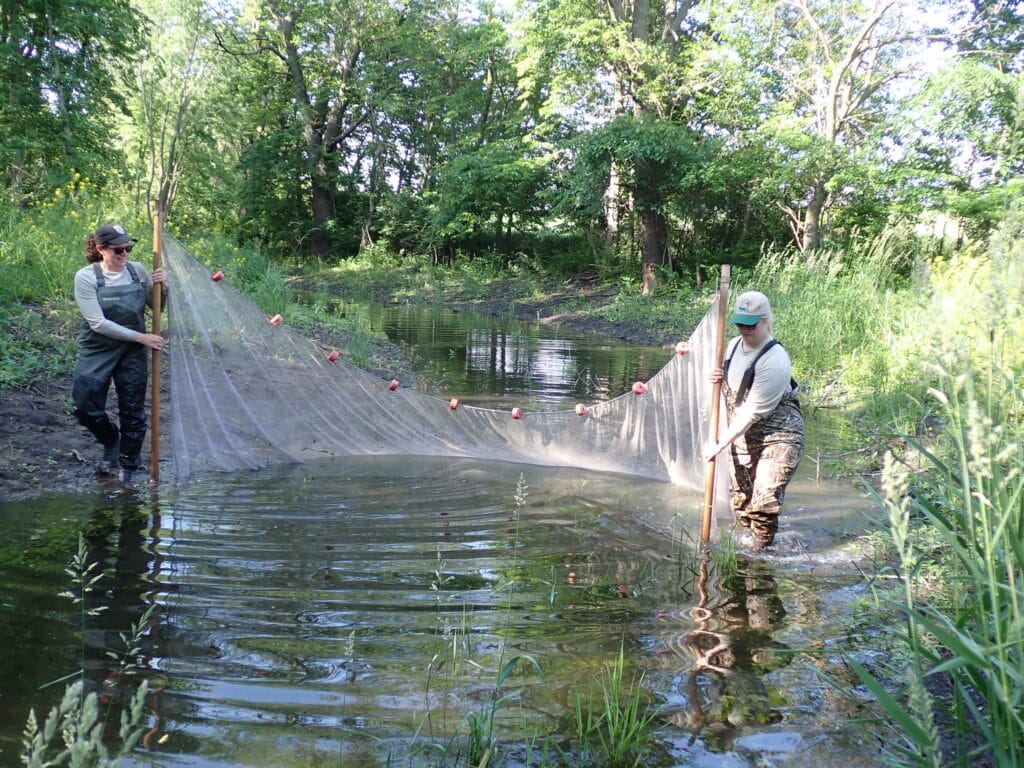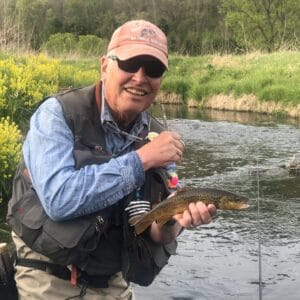Fisheries Professionals Issue a Call for Action about the Climate Change Crisis
Wisconsin's Green Fire, October 16, 2025

Walleye (Sander vitreus), photo by USFWS-Mountain Prairie via Flickr
Fisheries Professionals Issue a Call for Action about the Climate Change Crisis
Editor’s note: This article was prepared by Bill Fisher, Chair of WGF’s Fisheries Work Group, with input from Keith Reopelle and Nancy Turyk of WGF’s Climate & Clean Energy Work Group and WGF’s Executive Director, Meleesa Johnson. Editing by Carolyn Pralle, WGF’s Communications and Outreach Coordinator.
“Now is the time to combat detrimental, human-caused climate change if we wish to conserve the world’s aquatic ecosystems and fisheries.”
This quote on fisheries and human-caused climate change is the opinion of 30 past presidents of the American Fisheries Society (AFS). It comes from their August 2025 article in the journal Fisheries. Anyone can read the open-access article via the link below:
- “The climate change crisis: A call for action by Past Presidents of the American Fisheries Society.”
- Citation: Scott A Bonar, Charles C Coutant, Ron Essig, Mary C Fabrizio, William L Fisher, Robert M Hughes, Wayne A Hubert, Christopher C Kohler, Steve L McMullin, Christine M Moffitt, Brian R Murphy, Henry A Regier, The climate change crisis: A call for action by Past Presidents of the American Fisheries Society, Fisheries, 2025; vuaf074, https://doi.org/10.1093/fshmag/vuaf074
AFS has been a leader in communicating climate change science and the effects of climate change on fish, fisheries, fish habitats, and other aquatic life. According to AFS, it is the oldest and largest professional society representing fisheries scientists. The organization has provided scientific talks and articles since the 1980s. However, this information does not often reach the broader public.
Science can be more impactful when it reaches broader audiences, beyond professional scientists.
This is especially true when the stakes are high. The threats that climate change poses to our aquatic ecosystems and fisheries in turn matter for people. That is why the past presidents of AFS are urging people to share the evidence and urgency of the situation. They call upon people from many different groups—fisheries and aquatic scientists, managers, educators, as well as anglers, aquaculturists, and commercial fishers.
We can use the scientific evidence to communicate about how human-caused climate change is impacting fishing, fisheries and aquatic environments. This information matters, particularly as climate change denial is driving public policy.

Recovery sampling for Topeka shiners. Staff from the Illinois-Iowa Ecological Services Field Office, La Crosse Fish and Wildlife Conservation Office, Minnesota-Wisconsin Ecological Services Field Office, Partners for Fish and Wildlife Program and Iowa Soybean Association worked together to complete recovery sampling for Topeka shiners in restored oxbows throughout west central Iowa. Photo by USFWS via Flickr.
What does this mean for Wisconsin?

A fly fisher, Steve Engelbert, about to release a medium small trout in the driftless area of southwest Wisconsin. Photo by Ed Culhane.
For example, in Wisconsin, walleye natural reproduction is declining in northern waters. As the water warms and becomes clearer, the habitat becomes less favorable for walleye. Walleye are a cool-water species. They are low-light predators and prefer cooler, darker-stained water. Accordingly, the habitat becomes more favorable for competitor species like largemouth bass who prefer warmer, clearer water with vegetation.
Wisconsin’s coldwater streams are warming, resulting in reduced habitat and refuges for cool and coldwater species like brook trout. Alarmingly, brook trout are projected to lose 94% of their stream habitat under a moderate warming scenario of 4.3°F increase in water temperature. These changes are impacting fishing and the livelihoods of recreational, commercial and subsistence fishers.
The AFS past presidents have issued a call for action.
They call for interested fisheries and aquatic scientists, managers, anglers and concerned citizens to join in reaching the broader public with messages on the reality of the climate change crisis.
This call to action includes options like:
- Write a letter to the editor or opinion piece for the outdoor pages of your local newspaper about the climate crisis.
- Contact elected officials and others about the importance of managing the climate crisis.
- Write articles for angler newsletters.
- Deliver presentations to local groups interested in fishing about how climate change is affecting local fisheries. This could be local angler groups, lake associations, youth organizations, or others.
- Talk to your friends, family, neighbors, and others you meet fishing about the impacts of climate change. Listen and discuss people’s questions and personal observations.
- Coordinate with conservation organizations to amplify the message.
In Wisconsin, biologists and scientists have been studying how climate change impact the state’s fisheries and aquatic ecosystems for many years. Their research is summarized and available to the public on the Wisconsin Initiative on Climate Change Impacts (WICCI) website.
Wisconsin’s Green Fire’s Work Groups are actively working on strategies to communicate this climate change message. We want to reach WGF members, anglers, and others who care about aquatic ecosystems and fisheries. We want to share this information cooperatively with other conservation groups in Wisconsin, too.
WGF welcomes your input (contact us). Additionally, we love to hear about the actions you are taking. Tell us about your experiences with one of the actions listed above or another idea.
Our community of voices for conservation at Wisconsin’s Green Fire needs your support and involvement.
Invite your friends and family to become members of WGF to join this effort to combat the climate change crisis. Thank you.

Young Lake Trout, photo by Katie Steiger-Meister, USFWS Midwest, via Flickr
